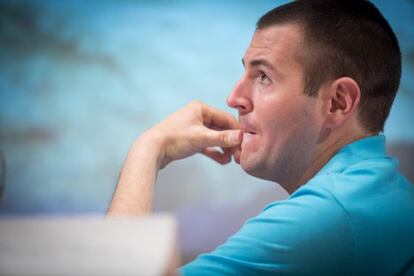“The rescue effort was a botched job,” says survivor of caving accident
Spelunkers blame Moroccan and Spanish governments for the deaths of two Spaniards

The surviving caver from a climbing accident last week in a deep ravine in Morocco’s Atlas Mountains, in which two of his companions died, has accused Moroccan authorities of “a botched job” in their rescue efforts.
Juan Bolívar Bueno made an emotional appearance before the press in his native Granada on Friday to explain how his two fellow spelunkers, lawyer Gustavo Virués and police inspector José Antonio Martínez, died earlier this month during an excursion in the North African country. Both victims were 41.
“I saw them talking to each other, and I looked down for a moment, and when I glanced at them, I saw them falling,” said Bolívar, who is also a police officer. “It was like in the movies; you don’t think it could really be happening.”
“I looked down for a moment, and when I glanced at them, I saw them falling. It was like in the movies”
The three cavers went missing on April 1 after they broke off from a main group of spelunkers to explore caves in the Ouandras Canyon on their own. They were trapped at the bottom of a deep canyon for five days before rescue teams were able to reach them.
Spain had initially offered to send in a specialized rescue unit but Rabat told Madrid that it had the situation under control. It wasn’t until Sunday April 5 that Moroccan authorities allowed the Spanish rescuers to fly in after two of the cavers died.
“The three of us walked together calmly for many hours. We were a group that was going on an excursion; we had everything planned, including a contour map that showed a waterfall at 500 meters and a shortcut at five meters,” Bolívar recalled.
Once Virués reached the waterfall he began climbing. Martínez fed him rope while Bolívar remained at the bottom collecting equipment in the backpacks.
“We had everything planned, including a contour map that showed a waterfall at 500 meters”
Bolívar said he could hardly hear anything due to the noise of the waterfall. Martínez began his ascent to see how Virués was doing. That was the last time Bolívar saw them before they suddenly fell.
The survivor struggled to hold back his tears as he recalled the tragedy.
Virués was killed instantly. “He wasn’t moving; his eyes weren’t blinking. He was dead.” His body was left suspended for at least two days before it fell to the bottom of the canyon, a witness said.
Martínez was badly injured, and for five days Bolívar nursed him while giving him food and trying to keep up his spirits. “I gathered all the heavy coats that we had and threw them on him,” he said.
Five days later, a rescue team from the Moroccan Royal Gendarmerie reached the survivors. “They told me they didn’t have any lifting equipment so everything was going to be done manually,” he explained.
“José Antonio was still in the water and I could him yelling, ‘I am drowning, I am drowning’”
The rescuers threw him a rope and small stretcher. “I saw that no one was coming down to help me, but I refused to move him into the stretcher because I am not a doctor.”
An officer came down and put Martínez in the stretcher. Bolívar said that he told his friend to hang on for five minutes: “We are alive and we are going home.”
But when they started pulling the injured man up the mountain Bolívar said he heard Martínez yelling. The stretcher with the gendarme rescuer swung into the waterfall. The officer who was hooked on alongside the injured victim escaped as he could and left José Antonio in the water.
“He told me that his head was sticking out of water,” Bolívar recalled. “I didn’t know what to do. There is no explanation for this. José Antonio was still in the water and I could him yell, ‘I am drowning, I am drowning!’”
Martínez died the next morning after being trapped in the water overnight.
“José Antonio spent five days trying to survive, and the only five minutes we were separated, they killed him”
“José Antonio spent five days trying to survive because he was a strong man. He was one of the good guys, and the only five minutes we were separated, they killed him,” said a tearful Bolívar.
José Morillas, a member of the larger expedition who was also at the news conference, announced that legal action will be taken.
“What happened to José Antonio was a negligent murder on the Moroccan government’s part, because they just wanted to show the world that they were prepared, and on the part of the Spanish government for believing them,” Morillas said.
The two bodies were removed during a complex operation carried out by three specially trained Civil Guard officers from the agency’s mountain rescue unit that eventually reached the area after Rabat gave the green light for them to travel to Morocco.
Their bodies arrived on Thursday at Adolfo Suárez Madrid-Barajas International Airport, where their families awaited them, along with Deputy Foreign Minister Cristóbal González-Aller and Francisco Martínez, the secretary of state for security.
Bolívar arrived on Tuesday after he was released from a Moroccan clinic.







































